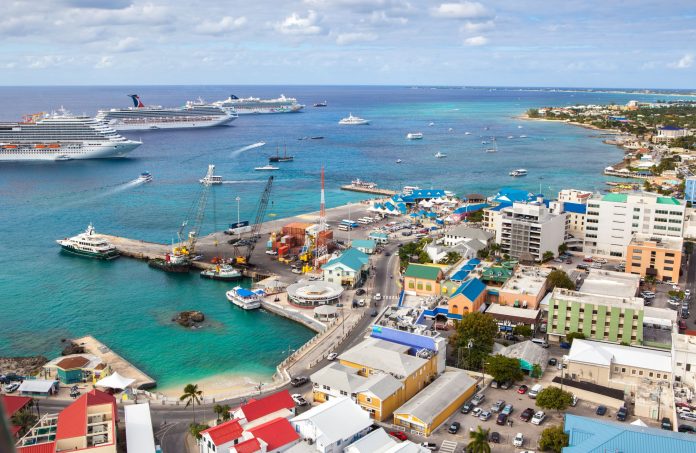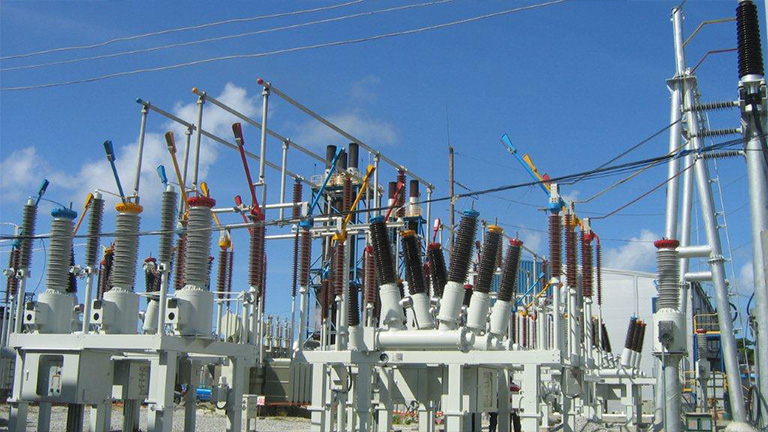A referendum on the controversial cruise and cargo port development in the Cayman Islands will be delayed at least until next year following a court order Tuesday.
The decision to schedule the poll on Dec. 19 before the completion of an updated environmental impact assessment, was challenged in court by Shirley Roulstone, a leading member of the Cruise Port Referendum Cayman campaign group. Roulstone also raised legal concerns about the fairness of the provisions for the referendum.
Grand Court judge Tim Owen granted leave to apply for judicial review to Roulstone and a trial has been provisionally scheduled Jan. 20, pending courtroom availability.
Justice Owen ordered that the referendum be delayed at least until the judgment is delivered following that trial.
The National Trust had also brought a legal challenge but agreed Tuesday to join its case with Roulstone’s because of the similarity of its arguments on the environmental points.
Justice Owen said Roulstone’s lawyers had met the threshold to proceed to full trial.
He acknowledged government had advanced “strong arguments” in response but said these were not the “knockout blows” necessary for him to dismiss the case at this stage.
“This case plainly involves issues of great constitutional importance for the Cayman Islands – questions which have never been considered before because this is the first time that Section 70 of the Constitution, which provides for a people-initiated referendum has been triggered,” the judge said.
Roulstone’s lawyers argued four main grounds for judicial review:
- That Cabinet had pre-determined the question and date before the port referendum legislation had been passed.
- That Cabinet failed to consider important matters including having “due regard” to protection of the environment, as required by the Constitution.
- That the question Cabinet set for the referendum was neither fair nor neutral, as required by law.
- That the failure to provide any campaign-finance limits, frustrated the intent of the Constitution that a free and fair vote should take place
Justice Owen, appearing by video-link from London, granted leave to proceed on all four grounds.
Helen Mountfield QC, representing Roulstone, said there was a “manifest inequality of arms” between government and those opposing the port in terms of their finances.
She said the constitutional duty for a people-initiated-referendum carried with it an implication that it should be a fair and effective referendum.
Mountfield, also speaking by video-link, said the timing, the nature of the question and the lack of campaign-spending restrictions – similar to those required in a general election – suggested this was not government’s plan.
“All of this leads to an inference that government was not intending to have a referendum and prevail on the merits but intended to railroad its view through irrespective of the factors that would make for a fair referendum,” she said.
Mountfield, of UK law firm Matrix Chambers, submitted a legal opinion on government’s Referendum Law for the port, prior to its debate and passage in the Legislative Assembly.
In response, government dropped the date and question from the bill, in an effort to satisfy a condition of the Constitution that those aspects should be set with reference to the legislation after it is published.
Mountfield suggested Cabinet had then simply “rubber stamped” the same date and question, without reference to the concerns Matrix had raised, including the fairness of the phrasing of the question and the need for campaign finance limits.
The lawyers have taken issue with the use of the words “move forward” and “enhanced cargo port” in the question, suggesting the wording is not neutral.
Government’s lawyer Alan Maclean QC, also speaking via video-link, had earlier suggested that Roulstone’s arguments should be thrown out.
“You can’t aggregate four thin points to make one fat point. They are too anorexic to pass on their own,” he said.
He said Cabinet had not simply “rubber stamped” the original question and date but had reconsidered these aspects after the law was passed and agreed to proceed.
He said government was required to consider the environment in its final decision on whether to proceed with the project. But he said this was not a relevant consideration when determining the date of the referendum. He acknowledged, following questions from the judge, that a $200,000 study to determine the scope of works for a potential update to the Environmental Impact Assessment was under way and could theoretically be published the day after the referendum.
But he maintained that it would be unreasonable to expect the vote to be held off indefinitely and suggested a delay of more than a year could be expected if a full EIA update is determined to be necessary.
Referencing the contentious UK Brexit poll, he said it was not a prerequisite of a legal referendum that “full, final and perfect information” be available.
He added that Cayman’s Constitution required government to move quickly to hold the vote.
“The whole thrust of it is that the referendum should be got on with. It is not something that should be kicked into the long grass pending 18 months of further deliberation,” Maclean said.
Lawyers for the National Trust spoke briefly during the hearing and agreed to join their case with Roulstone’s on the basis that they are advancing similar arguments about the lack of up to date environmental information available. Tom Lowe, QC for the National Trust, said government had done the right thing by consulting and carrying out an EIA in the first place but had then negated this by putting out “completely different and misleading” messaging on the environment in advance of the referendum.
A separate application for a protective costs order shielding Roulstone from excessive legal costs if her case is not successful will be heard by the Chief Justice Anthony Smellie on 23 Dec. The National Trust has indicated it will attempt to continue the action in place of Roulstone if such an order is not granted. (Cayman Compass)




